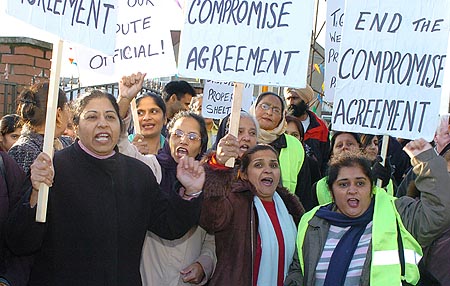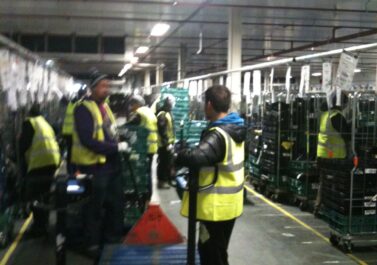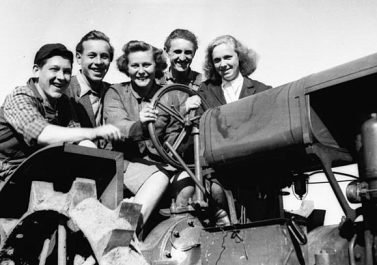Report about working at the airline caterer Alpha LSG – Sky Chef in Southall, near Heathrow airport
The following report is a longer version of a snappier article for our local paper WorkersWildWest [1]. We have distributed leaflets and newspapers at Alpha LSG before, this report is based on conversations with a friend. If you are too tired to read, why don’t you watch this propaganda video about the airline catering sector, which provides some insights into the work organisation in kitchens and warehouses.
https://www.youtube.com/watch?v=-C7bvN87U6E
If you have too much energy, you can check the attached list as to whether one of the many LSG Sky Chef units are around your neck of the woods. We will try and keep in touch with the LSG workers in Southall and maybe we can coordinate something beyond in the future…
*** Introduction
During the last 20 years the big airlines have outsourced catering and other work to smaller companies. They did this to protect themselves against a potentially strong and united workforce. Contracting out these services broke the power of workers and made more money for the bosses. The catering companies themselves became big global corporations, through a rapid concentration process. Alpha and LSG Sky Chefs merged in 2012 and now employ over 30,000 people in 50 countries, catering for over 300 airlines. There is big money involved: LSG made 73 million pounds profit on revenues of £2.6 billion in 2014. [2]
The attack on conditions, which was part and parcel of the various mergers, did not go down without a fight. The airline catering companies knew that they couldn’t allow their workers to get away with indiscipline or a strike: any delay in the food supply would result in flight delays, backlogs, and if deadlines aren’t’ met the airlines dish out heavy fines to the caterer or cancel their contracts. Air-traffic is the most strictly timed mode of transport and the catering workers in kitchens and warehouses 5 or 10km away from the airport feel that pressure on a day-to-day basis. In 1998 and 2005 workers in Southall, West-London, most of them of South Asian origin, many of them women workers, put up a fight, but the world’s biggest airline catering companies LSG and Gate Gourmet came down hard on them and the trade union was of little help.
* LSG, Southall, 1998 – Strike ends in a lock-out
LSG tried to force their workers in Southall to sign new, worse contracts. The workers, most of them TGWU members had two ballots before taking official strike action. On the first day a court injunction prevented them from going ahead. Management then sacked 200 workers on the second strike day and hired new ones. The company’s video cameras filmed the pickets at the gate: when strikers photographed scabs the police threatened them with arrest for “intimidation”. Only a few of the original workers got their jobs back, after months of symbolic pickets and legal show-fights. The TGWU union only gave lukewarm support to the workers – at the time the TGWU had thousands of members at Heathrow airport, but the union tactically decided not to call other workers out for support – no risk of a confrontation with the law or with the New Labour government at the time.
* Gate Gourmet, Southall, 2005 – Another hard strike
In the 1990s, British Airways (BA) outsourced work to Gate Gourmet. In August 2005 management wanted to enforce a worsening of conditions and one day brought in agency staff, factually replacing permanent workers. The old workers met up in the canteen to discuss and to protest against this move. In response management sacked over 800 workers over the next two days. An unofficial walkout by BA ground staff – mainly baggage handlers – at Heathrow airport in solidarity with the Gate Gourmet workers resulted in a 48 hours closure of the airport. But the baggage handlers had to return to work – the TWGU union did not want to be associated with ‘illegal’ support strikes. In the end the union told workers to sign contracts with worse conditions. [3] A very similar dispute happened at Gate Gourmet at Duesseldorf airport in Germany, showing the international character of developments. [4]
There are inherent opportunities for transnational struggles in the airline industry- and of course, major difficulties when workers want to collectivise struggles, divided as they are across space and companies. But as everywhere, the struggle continues, sometimes successfully.
* Sky Chef, Minnesota USA, 2011 – Protests against speed-up
Sky Chef workers were pissed off because in 2005 their wages were cut by 30% and many workers were subjected to disciplinaries. Years later, 40 worker mainly drivers and their helpers – confronted the manager, presenting demands against speed-up and for better sanitary conditions. Health premiums had gone up and wages had been stagnant. Just before Christmas the company distributed $10 gift cards. Many workers refused to take it. Such a small gift was an insult.
* LSG Sky Chefs, Finland, November 2013 – Support strike
Around 400 LSG workers walked out over pay. The following day there were no warm meals on the Finnair flights. Management tried to increase pressure on the workers, but the airline workers’ union threatened to go on a support strike. The threat alone was enough to get management to agree to a better offer.
*** Working at LSG in Southall
* THE UNIT
There are around 350 people working at LSG Alpha Sky Chefs warehouse and catering unit in Southall.
Office: 60 (incl. HR, transport office, security)
Warehouse: 10 (shifts start from 6am, 8am to 12noon)
Carts: 30 (incl. some temp-workers from ASAP)
Kitchen: 100 (incl. training-kitchens for chefs)
Dish-room: 30 (cleaning trays etc.)
Security: 20
Dispatch: 40 (incl. airport security)
Cleaning/Canteen: 15
Drivers: 150
There are three canteens.
* DIFFERENT CONTRACTS AND WAGES
People are employed on different contracts and terms and conditions.
Warehouse: £8-9 (plus £12 p/w bonus for fork-lift driving)
Dish-room/kitchen: £6.50 – £7
Dispatch: £8
Drivers: £10
Shop-floor-/Line Manager: £30,000 per year
While many managers in the office used to work on the shop-floor, only a few managers are hired externally, e.g. ex-army personnel.
People with old contracts have sick-pay and more paid holidays, double pay for working on their days off, time and a half pay for overtime. Everyone hired after the Alpha LSG merger in 2012 didn’t get these bonuses. In the warehouse half of the workers are on old, half on new contracts. People talk about the differences in conditions and pay, but it is mainly the guys on old contracts who mention to the new ones, e.g. that they are “paid double today”.
There are only few temp-workers hired through the agency ASAP – a quite significant local recruiter. One of them has been offered a permanent contract after two months, but their pay and conditions have hardly changed through this, given that, e.g. in the dish-room permanents are also on the minimum wage and zero-hour contracts. People on the shop-floor say that warehouse jobs closer to or in the Heathrow airport area pay more, but that the atmosphere there is worse and the pressure even higher.
No one really mentioned the 1998 dispute, most people were hired much later.
There are mainly male workers from Poland in the warehouse, mainly women workers of South Asian origin work in the kitchen, while the male drivers of the truck are from pretty mixed background. The way the unit is organised makes it difficult for workers of different departments to talk to each other at work.
* THE WAREHOUSE
The warehouse is supplied with drinks (Compass), bulk-staple-food (e.g. rice) and airline equipment (e.g. plastic-cutlery, WK Thomas). Bigger airlines supply their own equipment, e.g. once a week (Wednesday) a truck from American Airlines supplies airline equipment, Canada Airlines supply their own drinks, so does Quantas (monthly delivery in big container, plus irregular smaller deliveries).
The big airlines catered for are: American Airlines, Canada Airlines, Singapore Airlines, Quantas. They have their own alleys in the warehouse, whereas smaller airlines have only locations with a few pallets.
In addition to the general warehouse there is a smaller warehouse for the kitchen, plus a chill and freezer storage.
Usually orders are placed from the kitchen and dispatch area a day before at around noon, so ideally there is half a day to supply them with whatever they need. But then there are always emergency orders. Orders have to be given in paper form to the office. The office then passes these orders on to the warehouse staff. This procedure takes time.
There is a daily stock-taking for the airlines, but there tend to be discrepancies. All stock-taking and positioning of stuff is done on paper, but they want to introduce electronic barcode scanners.
The flights are not regular enough to develop a proper routine, there is a significant up and down of volumes, which means that overtime is announced at short notice. They try to issue plans with working times/overtime five days ahead, but that does not always work out. Usually there are two hours of overtime, in particular when other people are off sick or on holiday. Some workers work extra-days, sometimes a month without a weekly day off – but only those with old contracts get double-pay if they work on their day off.
* THE KITCHEN
There are ready-made salads and bread, whereas the basic meals are cooked. Soup is placed in big thermo-boxes.
* THE CART-LOADING AND DISPATCH
There is a lack of space in both the warehouse and cart-loading areas. Sometimes a pallet of, e.g. juices, can be placed in the cart-loading area, which lasts for two days, but most of the time there has to be a daily supply due to lack of storage space.
In the cart-loading department people are also on different contracts, paid between minimum and £9 p/h.
There are between 40 – 50 flights per day. A big aeroplane takes up to 80 carts. The peak-times are between 7am and 2pm, this is when most trucks go out to the airport. In the dispatch area there is space for about 300 carts. In one part of Dispatch people still stock carts, e.g. with bottles, in the other part carts are just stored and checked.
There are about 18 loading bays.
* THE DRIVERS
Some drivers are on 8-hour, some on 12-hour shifts (for company internal transport). Drivers have screens to see the flight-times and the carts that have to be loaded. People say it takes a while to learn this, at least a month. Drivers hang out around the screens, in groups of 5 – 10, whereas on the truck they are alone. They have to load the carts themselves, but there are also 4 – 5 people on the ramp to help them. One of the truck drivers has taken on a new driving job at Gatwick airport, which pays £2 more per hour.
During distribution of the newspapers we met drivers who were transferred to Alpha via Tupe, i.e. they should have retained their previous pay and conditions, but that they were now not giving them their holiday entitlements, saying that they’d made a mistake. They say the union (Unite) still hasn’t done anything, just playing for time and it’s difficult to do anything with the other workers because it only affects a few of them.
* THE RELATION BETWEEN LSG AND AIRLINES
There has been a long cooperation between Alpha and American Airlines (15 years), but in mid-2015 there were problems due to delays and Alpha might lose the contract. Some older workers say that if the American Airline contract is lost that there will be redundancies and that they would get redundancy money – in that sense they talk positively about the possible impact, because they hate the job.
In 2015 a smaller contract got lost and the airline then outsourced the work to a warehouse/catering unit across the street from Alpha LSG, a company called ‘Plane Catering’. This ‘loss’ was compensated by a different small contract coming in from another airline.
There are rumours that the Alpha LSG unit at Heathrow made £10 million minus in 2014 – but that might be due to company internal calculation and money transfers.
There is another Sky Logistics warehouse in Park Royal, which is run together with Kuehne and Nagel. They mainly serve British Airways, supplying non-food items.
*** Contradictory information from Alpha LSG at Manchester airport
Before we visited Alpha LSG at Manchester airport (May 2015) we read following report (from February 2013), which claims that the union was successful at reversing casualisation:
“Until recently, around 70% of the Manchester-based workers at airline catering company LSG Sky Chefs (now part of Alpha LSG Sky Chefs) were employed via a range of casualised arrangements. These included as-and-when contracts, umbrella companies and agencies. For the last eight or so years, the company has gone through a complex series of attempts at hiving off different sections of core work to outside providers to avoid the commitments of an in-house workforce. These culminated in the creation of a “labour provider” company (G.A.S.), which was 40%-owned by LSG. The arrangement also allowed the company to avoid the effects of the agency worker regulations on the pay bill. G.A.S. was being used by the company nationwide for its “general assistance” workers. This previously core workforce now consisted to a great extent of staff on zero-hour contracts and “336-hour contracts”, which only guarantee 336 hours of work a year. (This number of hours is significant as it is viewed by HM Revenue and Customs as the minimum employers must guarantee to take advantage of the tax allowance available for employees of umbrella companies.) However, unbeknown to the company, just as it was transferring staff out of its employment and into G.A.S., workers at the Manchester site were steadily joining the Unite union and preparing a bid for union recognition. This they achieved in November 2011. This was too late to stop the move to G.A.S., but at least recognition was carried over with the workers. The union subsequently put pressure on LSG Sky Chefs to transfer the Manchester workers back in-house. This was ultimately successful, and the process was completed last month. Last year, the company merged with Alpha Flight Group to form Alpha LSG Sky Chefs which, according to the Unite rep, thankfully signals a more secure and ordered future for staff. Having caused chaos for the companies as they were merging, the umbrella system was scrapped and the company has begun the process of bringing staff back in-house. The HGV drivers are also largely being brought in-house.” [5]
But workers in Manchester told us in May 2015:
There are in total around 200 workers (including kitchen, warehouse, drivers). Workers have 38 different contracts. 90% of the older Alpha workers were transferred to an agency called GAS after their merger with LSG in 2012, and had to accept a wage cut. Management promised the same pay as LSG after two years, but wages are still at £6.70. After two and a half years some people went to management and asked about getting the same pay, but management said that they haven’t given a written promise, so “what do you want?”. GAS also pays no sick pay. Workers said that the union wasn’t doing much. One driver said that they had had a pay offer of 0% this year and that they were thinking about stopping working overtime. A difference to London LSG is that the drivers have mates, so there are always two people in a truck.
***Outlook
With such big money and high stakes, it is no wonder that airline workers has been subject to major dividing strategies by management. Having a workforce with 38 different contacts under one roof, like the one at Manchester LSG, is pretty mind-boggling and testament to the lengths the bosses have to go to in order to keep things running smoothly. Of course, this provides a particularly complex set of problems for workers to overcome if they wanted to take collective action. What would it take for them to reject the divisions imposed from above and reproduced on the shop-floor and by the unions? What would it take for workers in airline catering to find common cause with airline staff, many of whom have also been subject to worsening pay and conditions, as the recent Air France workers’ dispute demonstrates?
The pinch is only going to get worse: as airlines consolidate, their bargaining power increases, and more customers opting for low cost flights on short haul routes means that demand for meals is decreasing. After 9/11, and again in the aftermath of high-profile plane disasters, airlines took a hit and have had to restructure. The effects were passed down the supply chain. Airlines have since since recovered; of course, this hasn’t been passed onto the workers, most of whom are still languishing on poverty pay, as we can see at the LSG that serves Heathrow Airport in Southall. We hope our small and continuing efforts can help workers make links with each other, as the only way they can begin forming a common power. The experiences of the previous conflicts at LSG and Gate Gourmet indicate that any strike will come up against a harsh response: it would need occupations/blockades of the units and solidarity actions beyond the workplace.
—-
*** Footnotes
[1]
www.workerswildwest.wordpress.com
[2]
[3]
http://www.striking-women.org/module/striking-out/gate-gourmet-dispute
[4]
http://www.gg-streik.de/ (website of the strike-solidarity group in Germany)
http://www.gongchao.org/www.prol-position.net/nl/2007/08/temp-workers-in-germany/temp6
[5]
http://www.lrdpublications.org.uk/printarticle.php?pub=WR&iss=1651&id=idp7973184
*** List of LSG units
Belfast (BFS)
Alpha LSG
Belfast International Airport
Burn Road
Crumlin
County Antrim
BT29 4AB
Phone : +44 (0) 289 4453881
Fax: +44 (0) 289 4453607
Birmingham (BHX)
Alpha LSG
Commissary Road
Birmingham International Airport Cargo
Birmingham
B26 3QE
Phone: +44 (0) 121 782 0133
Fax: +44 (0) 121 782 0141
Birmingham Blue Sky Service (BHX BSS)
Alpha LSG
Unit 24 Gateway Industrial Estate
Birmingham
B26 3QD
Phone: +44 (0) 121 767 1450
Fax: +44 (0) 121 782 2654
Birmingham Bond (BHX B)
Units 9 to 12
Gateway Estate
Birmingham Airport Cargo
Birmingham
B26 3QD
Phone: +44 (0) 121 782 6633
Fax: +44 (0) 121 782 4748
Bristol (BRS)
Alpha LSG
Administration Building
Bristol International Airport
Bristol
BS48 3DY
Phone: +44 (0) 1275 473806
Fax: +44 (0) 1275 473807
Cardiff (CWL)
Alpha LSG
International Business Park
Cardiff International Airport
Rhoose
South Glamorgan
CF62 3BD
Phone: +44 (0) 1446 71 3229
Fax: +44 (0) 1446 71 1766
Doncaster (DSA)
Alpha LSG
Unit 21, Second Avenue
Off Hayfield Lane
Doncaster
DN9 3RB
Phone: 07921485278
East Midlands (EMA)
Alpha LSG
Building 17 Viscount Road
Nottingham East Midlands Airport
Castle Donington
Derby
DE74 2SA
Phone: +44 (0) 1332 810026
Fax: +44 (0) 1332 811441
Edinburgh (EDI)
Alpha LSG
Almond Road
Edinburgh Airport
Edinburgh
EH12 9DN
Phone: +44 (0) 131 333 4366
Fax: 44 (0) 131 333 4716
Glasgow (GLA)
Alpha LSG
Unit E2, Air Cargo Centre
Arran Avenue
Glasgow Airport
Renfrewshire
PA3 2AY
Phone: +44 (0) 141 840 2910
Fax: +44 (0) 141 889 3982
Prestwick (PIK)
Alpha LSG
Building 373
Alpha LSG Freight Area
Roberston Road
Prestwick Airport
KA9 2PQ
Phone: +44 (0) 1292 511326
Fax: +44 (0) 1292 511329
Leeds Bradford (LBA)
Alpha LSG
Whitehouse Lane
Leeds Bradford Airport
Yeadon
Leeds
LS19 7TZ
Phone: +44 (0) 113 250 3285
Fax: +44 (0) 113 250 0819
London – Gatwick (LGW)
Alpha LSG
Faraday Road
Crawley
West Sussex
RH10 9JX
Phone: + 44 (0) 1293 404810
London – Gatwick MMS
Alpha LSG
1A Camino Park
Gatwick Road
Crawley
West Sussex
RH10 9RN
Phone: +44 (0)1293 514097
London – Heathrow (LHR)
Alpha LSG
The Encompass Centre:
International Avenue
Heston
TW5 9NJ
Phone: +44 (0) 20 8797 3400
Fax: +44 (0) 20 8797 3388
London – Stansted (STN)
Alpha LSG
1 Long Border Road
Stansted Airport
Stansted
Essex
CM24 1RL
Phone: +44 (0) 1279 680900
Fax: +44 (0) 1279 680940
Luton (LTN)
Alpha LSG
Provost Way,
London Luton Airport
Luton
Bedfordshire
LU2 9PB
Phone: +44 (0) 1582 737411
Fax: + 44 (0) 1582 458320
Manchester (MAN)
Alpha LSG
Building 402
Avro Way, Manchester Airport
Manchester
M90 5AF
Phone: +44 (0) 161 493 4000
Fax: +44 (0) 161 493 4178
Manchester Bond (MAN B)
Building 319
World Cargo Centre
Manchester Airport
Manchester
M90 5EX
Tel: 0161 435 1800
Fax: 0161 435 1811
Manchester Stanley Green
Unit E8 Countess Avenue
Stanley Green Trading Estate
Cheadle Hulme
Stockport
SK8 6QS
Tel: 0161 488 4202
Fax: 0161 488 4317
Newcastle (NCL)
Alpha LSG
Maintenance Area,
Newcastle Airport,
Woolsington
Newcastle-Upon-Tyne
NE13 8BZ
Phone: +44 (0) 191 286 8594
Fax: +44 (0) 191 271 5844



